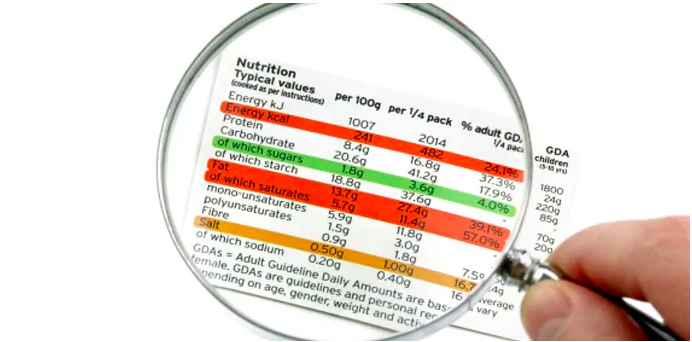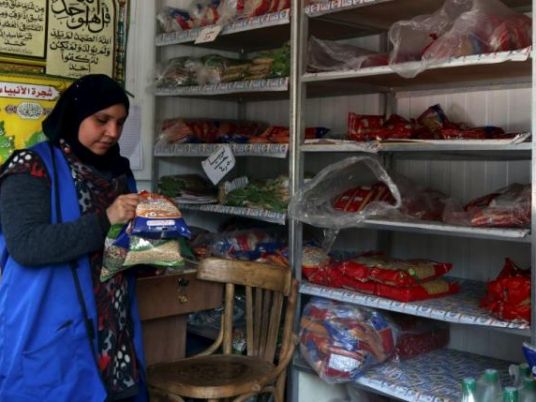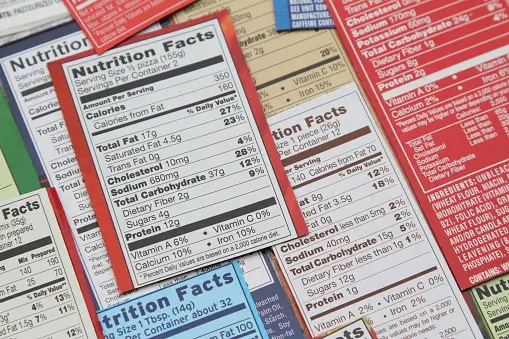
Mervat Abdullah, a fitness enthusiast following a health diet, wondered why her goals felt so unattainable no matter how hard she worked.
She lived off nothing but protein shakes and nutrition bars made locally here in Egypt.
In February, she came across a video on social media that exposed a few brands of whey protein in the Egypt. This finding filled her with anxiety and concern, leading her to turn to a doctor to undergo medical tests, which showed a diagnosis of type II diabetes.
Mervat was disheartened to discover why her progress had fallen short of her hopes.
“Is that advertising? Or is it brainwashing? Whatever the cause, it is certainly self-serving and financially rewarding for Egypt’s food sector to implant the idea that protein bars are secure and simple to include in a balanced diet. My current regret is that I find it uncomfortable to eat real healthy carbohydrates. Since processed food like protein bars that are high in sugar have blocked my blood sugar mechanisms, fruits and whole grains that probably never would have caused me diabetes in the first place are now too high in sugar for me,” she lamented.
Mislabeling is false and misleading advertising where a product’s label makes inaccurate and exaggerated claims. When a product is incorrectly labeled, consumers run the risk of not receiving what they thought they were buying.
A video recently went viral that exposed companies that claim to have a high percentage of protein in their protein bars. Many retailers have reduced the price of protein bars after the video went viral and others have added promotions and offers to the products.
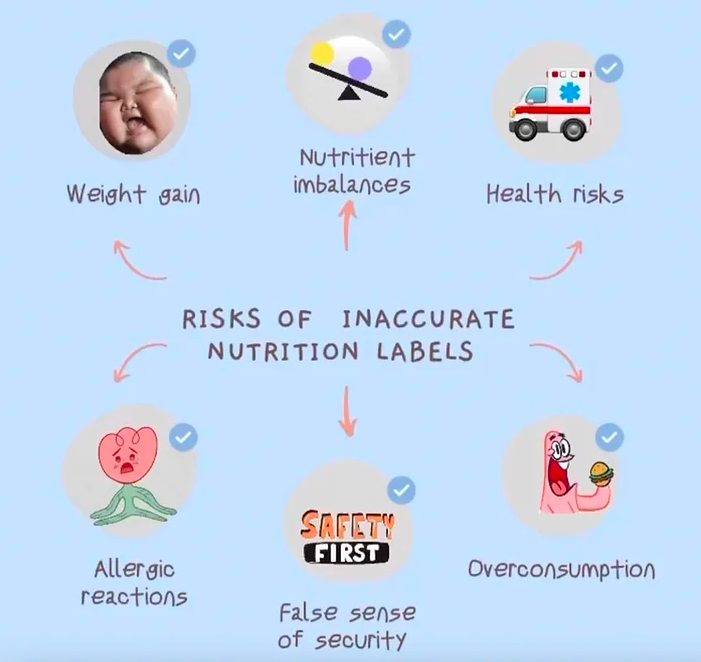
The law of labeling in Egypt
Laws and regulations related to food safety are issued by different ministries in Egypt: Health and Population (MOPH); Agriculture (MALR); Trade and Industry (MTI); and Supply and Home Trade.
There is no specific law in Egypt against mislabeling products.
However, in 2018, President Abdel-Fattah al-Sisi added a new consumer protection law which protects the consumers right of choice and honest advertising. The new legislation criminalizes the monopolization of any product or market and fraudulent and/or misleading ads in any format, with a fine of up to LE two million per infringement, with strong penalties against businesses or merchants who breach laws.
According to Egyptian Lawyer Mahmoud Serag, “A supplier who violates the Consumer Protection Law could face sanctions. They include publication of the infraction in national publications and fines of no less than E£5,000 and no more than E£200,000. (Article 24 of the Consumer Protection Law).”
The director of the National Institute of Nutrition Gehan Fouad said that there is no law established to clearly ensure food safety in Egypt regarding the labeling of products.
“The requirement of bringing the product to the market doesn’t include testing the accuracy of the labels on the product, however if someone wants to test a specific product there are labs for that.”
Fouad explained that the process of bringing a product to the market requires a committee to approve the labeling of the product but not the testing of the actual product.
The process of bringing a product to the market requires a committee to approve the labeling of the product but not the testing of the actual product, she said.
Sometimes the idea of the product becomes rejected before it even gets produced due to the unusual creation of the project, she added.
For instance, a protein bar that is made mainly with dates, its sugar content would be labeled too high so it is rejected before the committee even approves it.
However this process can take a long time – almost six months.
The world’s love for protein bars – and how the US makes sure they’re safe
When we look to the rest of the MENA region, Kuwait stands out as having a huge demand market for protein bars – yet with the same regulations Egypt does.
So long as the product is FDA approved, it is sold – but there are no regulations strictly for the labeling.
The US, on the other hand, features strict laws for labeling products. The US Food and Drug Administration (FDA) ensures that all goods brought into the country adhere to strict rules are are safe for use by the public.
The FDA prevents the release of a product if it exhibits symptoms of adulteration, is mislabeled, or was not authorized for importation into the country.
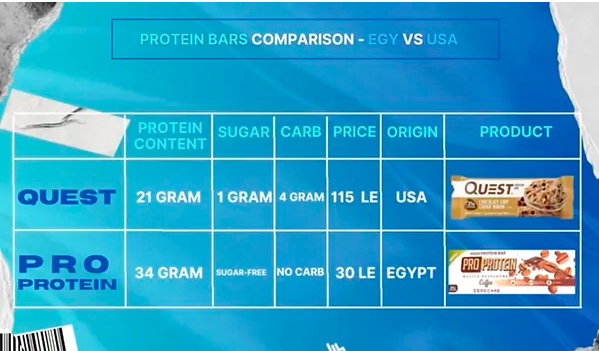
Hungry for profit
Misleading labels on products in the Egyptian market are a persistent problem that pose a real threat to the health of consumers.
There are several reasons why the widespread prevalence of misleading labels still occurs – one major factor being the profit-driven motives of companies.
Greedy companies prioritize their profits over consumer well-being, resorting to misleading labels as a way to increase sales and revenue.
According to Marketing Specialist “Aly” – whose name has been changed to protect his privacy – “After working in the industry for almost three years, in my own point of view, companies that add inaccurate label on their products, tend to cut the cost of protein in order to increase the cost margin.”
As there is no specific law for mislabeling products in Egypt, many companies tend to write the correct ingredients on the product leave out the actual percentage of these ingredients.
A Technical Officer at the World Health Organization of Non Communicable Diseases and Nutrition, Abou al-Naga, explained how many companies deliberately mislead consumers through their labeling practices, through omitting or downplaying certain ingredients or characteristics of their products that could be harmful or undesirable to consumers.
She says: “Companies have a motive to withhold accurate nutrition information on their products, as it may benefit them financially. For instance, they might refrain from disclosing high levels of fat content or the presence of certain acids that could potentially harm consumers, as this may discourage customers from purchasing the product.”
“Essentially, the primary reason why companies avoid providing precise nutrition facts is to safeguard their profits.”
According to Naga, the World Health Organization (WHO) has reportedly submitted proposals to the Ministry of Health which include regulations on the labeling of food products such as whey protein products.
“Before enforcing regulations and laws on food labeling, it is crucial to raise awareness and educate individuals on comprehending the information provided on food labels. This approach allows individuals to make informed decisions regarding their dietary choices and avoid potentially harmful ingredients or misleading claims,” she says.
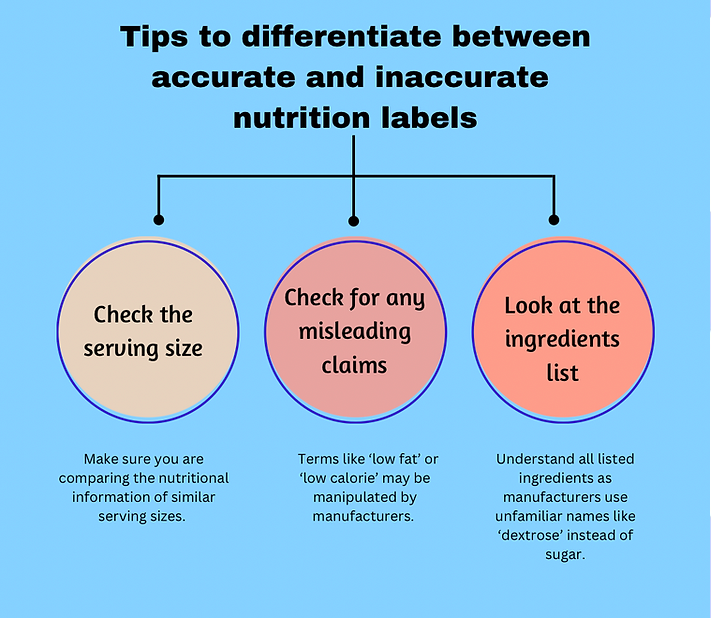
A colorful solution
Naga added that if it is too difficult for the Ministry of Health to establish laws and regulations on food label, the WHO proposes to do it using the traffic light labeling.
“Traffic light labels are commonly used worldwide. The concept requires color-coding products based on how healthy they are. If a product is labeled green, it is considered safe and healthy. Yellow indicates that the product meets some of the standards, but contains some unhealthy ingredients. Red means that the product should be avoided altogether, which would encourage companies to use healthier ingredients.”
“This could be a perfect solution, considering that 40 percent of the Egyptian population is illiterate.”
